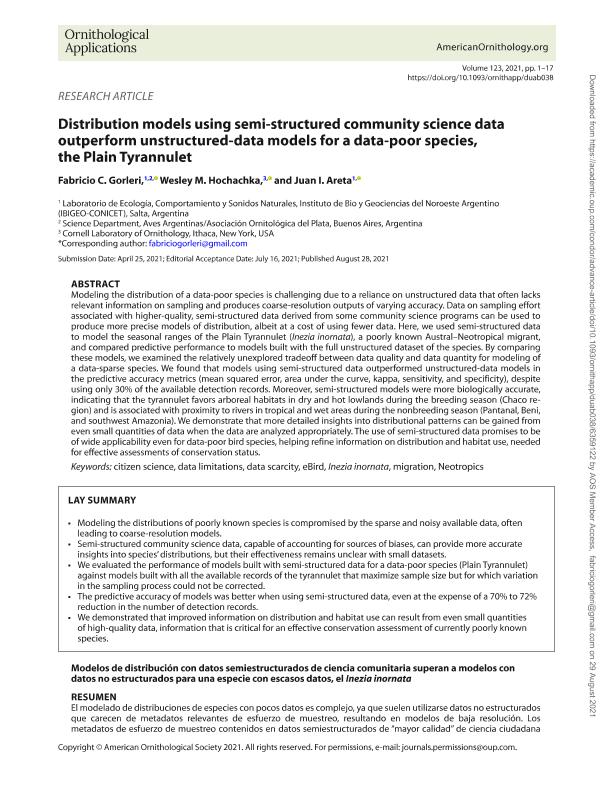Artículo
Distribution models using semi-structured community science data outperform unstructured-data models for a data-poor species, the Plain Tyrannulet
Fecha de publicación:
11/2021
Editorial:
Cooper Ornithological Society
Revista:
The Condor
ISSN:
0010-5422
Idioma:
Inglés
Tipo de recurso:
Artículo publicado
Clasificación temática:
Resumen
Modeling the distribution of a data-poor species is challenging due to a reliance on unstructured data that often lacks relevant information on sampling and produces coarse-resolution outputs of varying accuracy. Data on sampling effort associated with higher-quality, semi-structured data derived from some community science programs can be used to produce more precise models of distribution, albeit at a cost of using fewer data. Here, we used semi-structured data to model the seasonal ranges of the Plain Tyrannulet (Inezia inornata), a poorly known Austral-Neotropical migrant, and compared predictive performance to models built with the full unstructured dataset of the species. By comparing these models, we examined the relatively unexplored tradeoff between data quality and data quantity for modeling of a data-sparse species. We found that models using semi-structured data outperformed unstructured-data models in the predictive accuracy metrics (mean squared error, area under the curve, kappa, sensitivity, and specificity), despite using only 30% of the available detection records. Moreover, semi-structured models were more biologically accurate, indicating that the tyrannulet favors arboreal habitats in dry and hot lowlands during the breeding season (Chaco region) and is associated with proximity to rivers in tropical and wet areas during the nonbreeding season (Pantanal, Beni, and southwest Amazonia). We demonstrate that more detailed insights into distributional patterns can be gained from even small quantities of data when the data are analyzed appropriately. The use of semi-structured data promises to be of wide applicability even for data-poor bird species, helping refine information on distribution and habitat use, needed for effective assessments of conservation status.
Archivos asociados
Licencia
Identificadores
Colecciones
Articulos(IBIGEO)
Articulos de INST.DE BIO Y GEOCIENCIAS DEL NOA
Articulos de INST.DE BIO Y GEOCIENCIAS DEL NOA
Citación
Gorleri, Fabricio Carlos; Hochachka, Wesley Michael; Areta, Juan Ignacio; Distribution models using semi-structured community science data outperform unstructured-data models for a data-poor species, the Plain Tyrannulet; Cooper Ornithological Society; The Condor; 123; 4; 11-2021; 1-17
Compartir
Altmétricas




